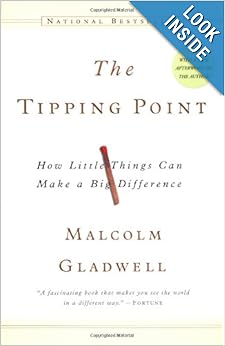In common parlance, "tipping point" refers to having a product or idea achieve main-stream popularity. Tipping-point ideas invade the collective conscious and change society.
The Tipping Point is about the events that lead up to the all-of-the-sudden part! Tipping points are about ideas that operate as viruses.
Viral ideas were popularized by Richard Dawkins' 1976 book The Selfish Gene which preceded The Tipping Point by four years. Dawkins identified the what -- Gladwell the how. Gladwell applies the tipping point to a wide range of issues such as the militia's response to the outbreak of the American Revolution, the battle against rising syphilis rates in Baltimore in the 1990's, and the clean up of crime in New York City in the same period.
Gladwell's "how" has three primary rules: (1) the law of the few; (2) the stickiness factor; and (3) the power of context. These three laws control the success of the viral outbreaks of ideas.
- The Law of the Few. When Paul Revere warned the citizens of Boston about the British attack, he mobilized the citizenry to defeat the British in that initial attack. We assume that his "message" was the power that led to that success, but William Dawes set out in the opposite direction and was almost completely unsuccessful. Paul Revere had personal attributes that contributed to his success -- he was both a "maven" and a "connector" -- see below.
- The Stickiness Factor. For ideas to be successful, they must "stick." For our new ideas, how do we identify, create, and leverage the "stickiness factor."
- The Power of Context. Good ideas only stick within the right context. How do we identify and mold the context to make ideas successful?
- Connectors. Connectors know everybody!
- Mavens. Mavens are the innovators that wade through mountains of information to make sense of it. Being a maven requires dedication to an idea or practice and a unwavering obsession. "Pricing mavens" are the easiest to understand: go to them to find out the best price for a commodity! I would suggest that a maven is the person you gravitate to for a specific "thing" -- commodity, idea, scientific principle, etc.
- Salesmen. Ever bought something from a great salesmen? The experience was very satisfying and a win-win transaction. Salesmen take a maven's idea and popularize it.
The Tipping Point is a beautifully written book and describes a powerful concept that we all need to be aware of. Gladwell has a gift for sharing new concepts through great examples.
The tipping point is a key concept in successful marketing campaigns as well as political campaigns. You need to read it to increase your effectiveness and to protect yourself from others who may apply the principles to achieve their goals at your expense!
If you liked Tipping Point, I'm sure you'll also like Gladwell's Blink -- a much less successful book on managing your insights. Blink is an equally powerful concept but more universally applicable!
